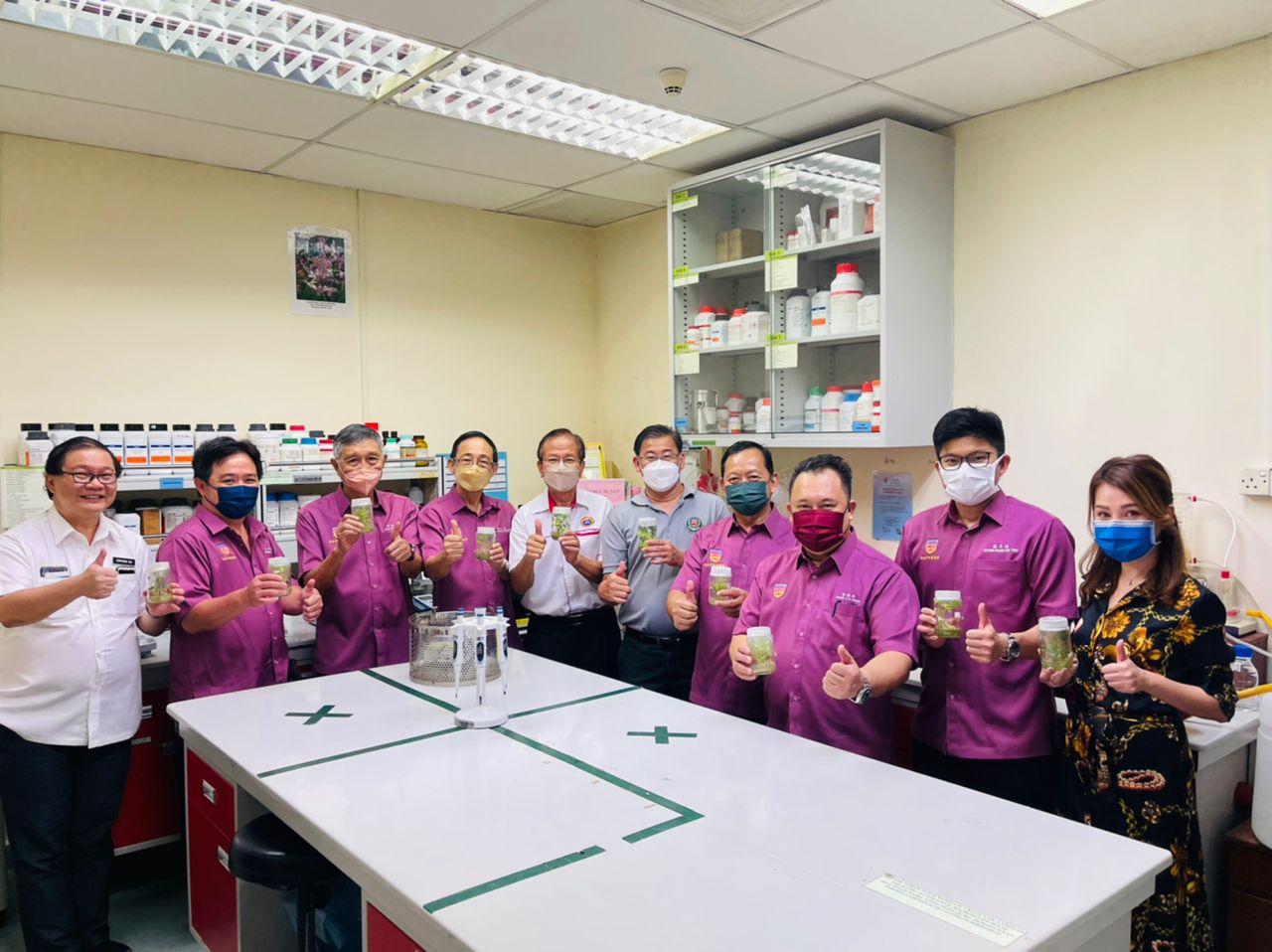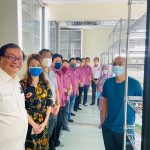马来西亚沙巴大学生物技术研究所基因实验室礼貌拜会。
A Visit to Biotechnology Research Institute of University Malaysia Sabah (UMS)
由亚庇中学董事长林克光先生与沙巴艺术学院董事主席暨华社领袖拿督斯里杨忠勇博士局绅率领的联合参访团一行28人,于2022年5月27日(星期五)上午9时正至下午2时30分,前往马来西亚沙巴大学生物技术研究所(Biotechnology Research Institute)基因实验室进行礼貌拜会
马来西亚沙巴大学生物技术研究所(Biotechnology Research Institute)植物组织培育(Plant Tissue Culture)专家诺阿兹尊博士(Dr. Nor Azizun binti Rusdi)称,随着农业科技一日千里,近年我国农产业也逐步引入植物组织培苗技术,以素质最优良的芽头组织,在无菌状态下培植出一模一样的果苗,产期和产量也能维持一致。比起使用种子的传统种植,更能避免种子变异后,失去了一颗优良果树的基因。
诺阿兹尊博士解释,“使用组织培苗,我们从果实最漂亮的果树选出芽头,以继代培养方式繁殖果苗,等同于复制一模一样的果苗,就能确保果实素质保持一致,也能节省传统种植法里以雄雌性培植的时间。”
诺阿兹尊博士在实验室强调,组织培苗最大的挑战是确保培植空间完全无菌,因此所有器具,如培植瓶、切割工具、工作台等都得处于无菌状态,而且动作必须小心谨慎,确保不会伤及芽头幼苗,若发现有病菌就得立刻丢弃,否则病菌接触切割工具,就会持续传染至其他培苗
上午10时正,在生物技术研究所(Biotechnology Research Institute)基因实验室移交第一代杂交种(Hybrid)日本紫番薯苗予亚庇中学董事会代表团,即董事长林克光先生,副董事长拿督邱陶正,董事拿督罗锦棠、甘坤游先生、包望侨先生、陈俊杰先生、黄基豪先生、潘韦特先生、冯佐诗女士。
黄业荣教授博士称,该第一代杂交种日本紫番薯的主要采用了发芽催芽条件和方法、培育壮苗技术和方法、培育管理,得到形大优质的杂交种日本紫番薯,以满足现代农业种植,提高农业生产种植经济效益。
A 28-member joint delegation courtesy visit to the Genetic Laboratory of Biotechnology Research Institute of University Malaysia Sabah was led by Mr. Lim Kiat Kong, Chairman of Kota Kinabalu High School Board of Governors, and Datuk Sri Dr. Wilson Yong, Chairman of Sabah Institute of Arts and Chinese Community Leader. The courtesy visit happened from 9.00 am to 12.30pm on the 27th of May 2022.
Dr. Nor Azizun binti Rusdi, senior lecturer and expert in Plant Tissue Culture at the Biotechnology Research Institute of the University Malaysia Sabah, said that with the rapid development of agricultural science and technology, our country's agricultural industry has gradually introduced the plant tissue culture technology in recent years. The tissue culture seedling technology uses the best quality sprout head tissue to cultivate exactly the same fruit seedlings in a sterile state, whilst maintaining the production period and yield. Compared with the traditional planting method using seeds, it can avoid the loss of the genes of an excellent fruit tree after the seeds are mutated.
Dr. Nor Azizun explained that “Using tissue culture seedlings, we select the shoots from the fruit trees with the highest quality and most beautiful fruits produce, and propagate the fruit seedlings by subculture, which is equivalent to duplicating the exact same fruit seedlings. It saves the time of cultivating the genes in traditional cultivation methods.” Dr. Nor Azizun emphasized that the biggest challenge of tissue culture is to ensure that the working space and environment in the laboratory are completely sterile, and all utensils such as culture bottles, cutting tools, work tables and so on must be in a sterile state. Every action must be performed vigilantly and cautiously to ensure that the sprout seedlings will not be damaged or contaminated. If any germs are found, they must be discarded immediately. Otherwise, the germs will continue to spread to other seedlings if they come into contact with cutting tools.
At 10:00 in the morning, the first-generation hybrid Japanese purple sweet potato seedlings were handed over to the Kota Kinabalu High School Board of Governors delegation in the genetic laboratory of the Biotechnology Research Institute. The joint delegation comprises of Chairman Mr Lim Kiat Kong, Vice Chairman Datuk Hiew Thien Choi, Datuk Lo Kim Thong, Mr. James Kang Kong Yew, Mr. Pau Ong Kiew, Mr. David Chan Chun Ket, Mr. Wong Kee Haw, Mr. Arthur Phang Wei Terd and Ms Joyce Fung. Professor Dr. Edmung Ng said that the first-generation hybrid Japanese purple sweet potato mainly adopts the conditions and methods of germination, the technology and method of cultivating strong seedlings, and cultivation management to obtain a large and high-quality hybrid Japanese purple sweet potato to meet the needs of modern agricultural planting. This will help to improve the economic benefits of agricultural production and planting.


